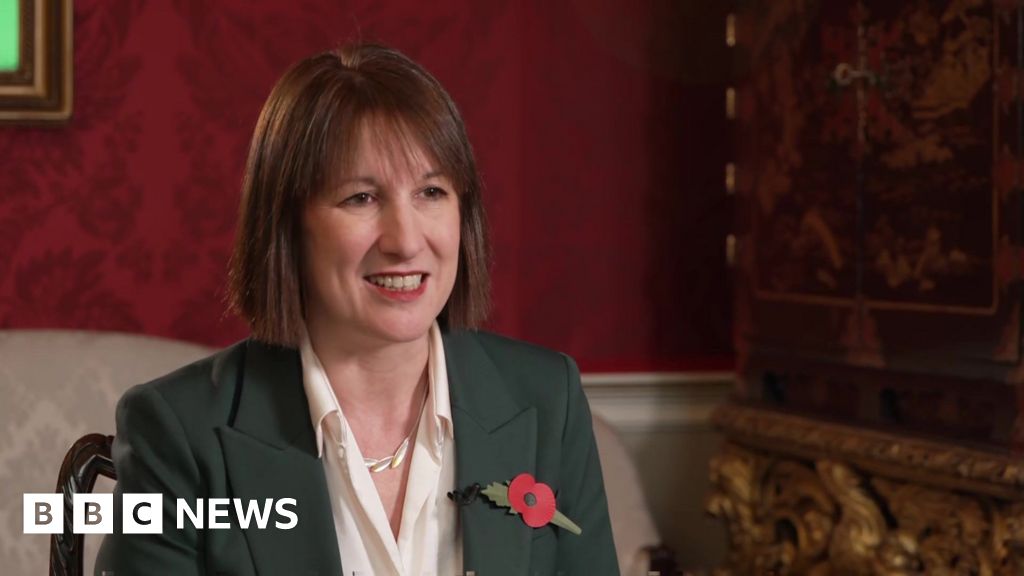Chancellor Rachel Reeves says she has now reached spending settlements with all government departments ahead of her much-anticipated Budget on 30 October.
It comes after reports of Treasury rows with multiple departments over the expected scale of spending cuts.
Reeves told BBC Radio 5’s Matt Chorley she had struck deals with all her cabinet colleagues – and in line with tradition, popped all balloons put up in the Treasury to represent each department’s funding agreement.
While sympathising with “the mess” her colleagues had inherited, Reeves insisted departments needed to find savings to balance the budget.
In recent Budgets, chancellors have adopted the tradition of hanging balloons in the office of the Chief Secretary to the Treasury to represent spending deals that must be negotiated with government departments.
As settlements are reached, the balloons are popped.
In the exclusive interview, Reeves said: “There are no balloons left in the Chief Secretary’s office – the balloons have been burst.”
In the run-up to the Budget, there have been reports of unease among cabinet ministers over potential cuts to meet a £40bn shortfall identified by the Treasury.
Sky News reported that the Treasury missed its initial 16 October deadline to finalise all major Budget measures for submission to spending watchdog the Office of Budget Responsibility ahead of the Budget.
Deputy Prime Minister Angela Rayner who runs the Ministry of Housing, Communities and Local Government, as well as Justice Secretary Shabana Mahmood and Transport Secretary Louise Haigh have all been reported as writing to Sir Keir Starmer to complain about the scale of cuts their departments were facing.
Haigh has since told the BBC she did not write a letter, but had been having Budget negotiations with the Treasury “in the normal way”.
Addressing reports colleagues had gone over her head to take their concerns about budget cuts directly to the prime minister, Reeves said, “I wouldn’t believe everything you read” in the media.
But she went on to say it was “perfectly reasonable that Cabinet colleagues set out their case – both to me as chancellor and to the prime minister, about the scale of the challenges that they find in their departments”.
“I’m very sympathetic towards the mess that my colleagues have inherited”, Reeves said.
“But any additional money, in the end, it has to be paid for either by taking money from other departments or raising taxes.”
Taxes on ‘working people’
The Labour manifesto promised not to raise income tax rates, national insurance or VAT to protect “working people”.
Labour also campaigned on a pledge not to “return to austerity” – the programme of deep spending cuts and tax hikes aimed at reducing the UK’s budget deficit pursued by the 2010 Conservative-Liberal Democrat coalition.
“All of those things mean that we do need to find additional money,” Reeves said.
Reeves admitted this meant she was considering tweaks to “other taxes to ensure the sums add up”.
“We were clear during the election campaign, you can’t undo 14 years of damage in one Budget or in just a few months,” she said.
“It is going to take time to rebuild our public services to ensure that working people are better off and to fix the foundations of our economy and our society as well.”
As she looks to balance the first Labour Budget in 14 years, Reeves admitted she speaks to several major political figures.
“I speak to Gordon regularly – I also speak to Tony Blair regularly,” she said.
She also maintains a “good relationship” with her predecessor Jeremy Hunt, regularly messaging the Conservative shadow chancellor.
“I may not be particularly impressed with the state of the public finances that he left me, but I do recognise that after Kwasi Kwarteng, he had a tough job to do as well,” she said.
The one person she wishes she could “pick up the phone to now” is Alistair Darling, the last Labour chancellor to deliver a Budget – who died last year aged 70.
Lord Darling served in cabinet for 13 years under both Blair and Brown, and was best known as the chancellor who steered the UK through the 2008 financial crisis.
“I hope that he would be proud of what I’m doing as the next Labour chancellor after him,” she said.
Reeves spoke about her pride at being the first female chancellor in the role’s 800-year history.
Becoming chancellor was “beyond what a girl like me, from the ordinary background that I came from, could have ever dreamed of,” Reeves said.
Now in her “dream job”, Reeves said, “one of the wonderful things in the first few months of doing this job is to meet female finance ministers from around the world” – such as US Secretary of the Treasury Janet Yellen and Chrystia Freeland, the Canadian finance minister.
“I take a lot of inspiration from those amazing women and so many others,” Reeves said.
